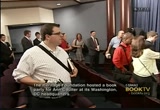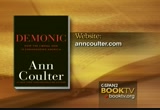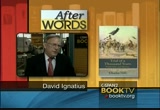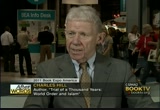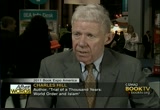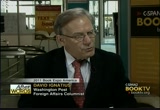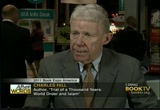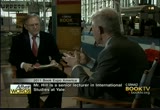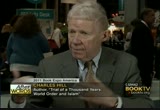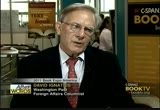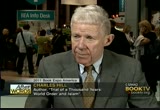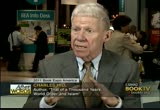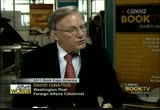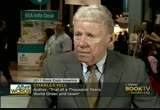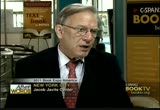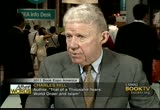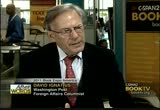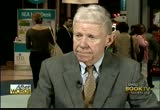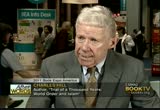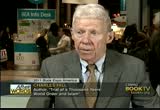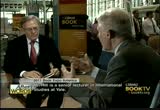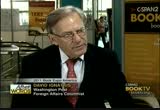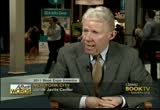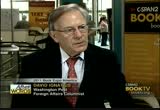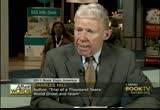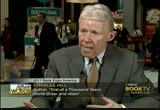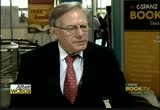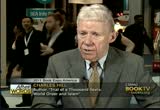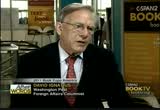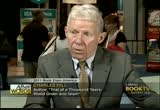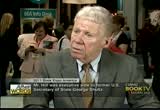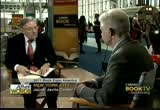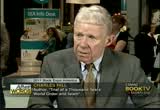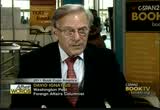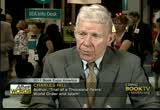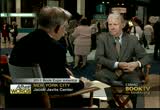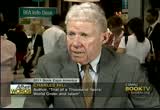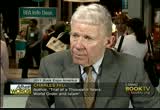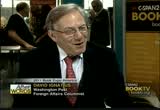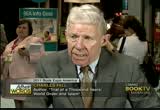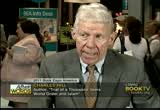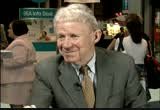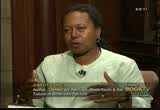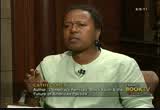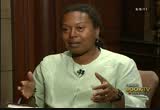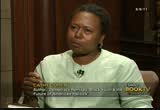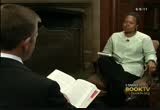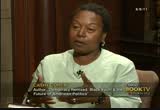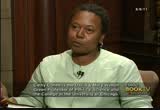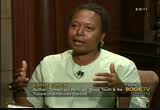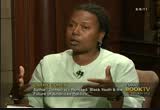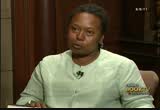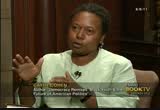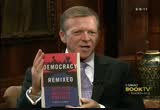tv Book TV CSPAN July 11, 2011 12:00am-1:00am EDT
12:01 am
[inaudible conversations] [inaudible conversations] [inaudible conversations] [inaudible conversations] >> anne had a book party launching her new book he'sed boy the heritage foundation. to find out more, visit anncoulter.com. ann will be abooktv guest on sunday, august 7 for thee hours beginning noon eastern taking e-mail questions and calls and
12:02 am
tweets. ♪ >> coming up next, booktv presents "after words," and hour long program where we invite guest hosts to interview authors. this week charles hill discusses his latest book, "trial of a thousand years," and in it he provides a perspective on islam analyzing what he calls its long war against the international state system. he identifies several areas claiming islamists are at odds with the rest of the world including their belief of the role of state law and the role of women. he discusses his analysis with david, foreign affairs columnist with the "washington post."
12:03 am
>> host: i'm david, the columnist for the "washington post." i'm here today to interview charles hill author of "trial of a thousand years, world order and islamism." very interesting book, and we're going to try to draw out some of the themes, and let me begin, charles, by asking you, this is an unusual book. it's like an old-fashioned essay than some of the monographs coming out of the academy, and perhaps you could just state simply what you see as the subject of this book? what is the issue that you're seeking to unlock for us. >> guest: the subject is really in the subtitle, and that's world order, and in some sense that has slipped away from the minds of leading statesman i believe, and also within that
12:04 am
world order, the international state system when is the way that the modern world is going back 350 or so years has evolved to order itself internationally, and what we see here and what i'm addressing is -- can islam or islamism which is the word we have come to employee for this, can it fit into this world order, the international state system. after world war i, the whole middle east region was really pulled into that system, but the states that formed the region and the regimes that governed them didn't do very well, and so the region as a whole has always been in this modern era in a kind of adversary uneasy
12:05 am
problematic relationship to the larger world which is a state, the united nations, the usual deformity in treaty systems, there's always been that tension there. i wanted to examine that to see what the origins might be and what the prospects might be. >> host: to help perspective readers of the book, perhaps you could summarize the distinction that you draw between modern states, the states that post-date the 1548 that ended the long religious wars which you say were states that focused on prospects, that the process of the state was issues of process, not issues of substance meaning not issue of religion. perhaps draw that argument out a little bit and tell us why those modern post-west states as we
12:06 am
call them, why those states have had trouble in this part of the world where islamist was from? >> guest: before the modern age, that's before the early 17th century, all the way back to antiquity, there was lots of con cement of world order. the chinese had a world order. there's a world order in the south asian area, a world area in south america in sense of the mayans and people thinking of themselves being the center of the universe and conducting things as if they were the only way to do it. that changed in the early modern period, 15th, 16th, 17th century when there was what i call the reconnaissance of the world when people coming out of europe primarily began to realize there was a globe out there, and there was many, many different kinds
12:07 am
of people in different societies, different religions, and it was going to be a very difficult thing to figure out how to deal with them. the catalyst of this which really the 30 years war, 1618-1848, which was a religious war, and the religions are substantive. one religion says i have the answer, the other says, no, you don't, i do, and they clash. coming out of that war is the treaty of wasalia in 1948, you get what is now still the modern contemporary international state system, and the elements of that are pretty simple. the state is the fundamental building block of it, but as you say it began to decide it had to be procedural. in other words, the substantive
12:08 am
approach to world order coming out of antiquity could not accept another substance. we are in an adversary position here and the only way to deal with this multiplicity of populations all around the world was to say just follow these three or four procedural guidelines and you can do whatever you want to do inside your own state, and as part of that, the state itself became the unit of international diplomacy, international affairs replacing essentially the empires. empires at this time were their own world orders and substantive, usually in a con tented, but the modern system said, no, that's not going to work. we're going to put religion on the shelf dipmatically. not that you can't have your
12:09 am
religion, but don't bring the religion to the bargaining negotiating table. we began to get this system into which the empires as they began to fade away either wished to get into as in the case of the automin empire were very aggressively wanting to stay out of, as in the case of the chinese empire, and in some sense the course of modern history over the last 200 to 300 years has been the struggle whether the international state system can have proceed chiewrs to succeed against one challenge after another, and that challenge today is coming out of islam and priorlily from -- primarily what we call islamism. >> host: to what extent is your argument here similar in terms of the basic thrust to the argument that samuel huntington
12:10 am
made in clash of civilizations talking about islamic civilization and its values and its projectory being fundamentally in collision with the west on all sorts of levels. >>i find myself reading your book it has the same basic confrontation that you're talking about, but -- tell us, what ways does your argument like huntingtons, and what way is it different? >> guest: it's a little bit like it, but fundamentally it's different. the argument that clashes civilizations when we look back on that book, and i, before his death, brought that up with professor huntington directly. it's really not a book about the clash of civilization. it's a disguise and it's really about islam because you look at what huntington is talking about
12:11 am
there, there isn't any clash between the civilization an lack of american civilization. it's not there. when you begin to draw the line of confrontation, they all are in the huntington -- all coming out of islam. islam, as he said, has bloody borders, so in some sense it takes off from that point that what really are we talking about here, and what i'm trying to get out in this book is that islam or islamism, that version of islam, remains within the mentality that is a civilizational mentality, and it doesn't fit with the procedural groups. they are in their own view because of the law and how they see the cos moes, and the international system says, well, okay, but don't -- don't bring that into our diplomacy, and this is the way we see things.
12:12 am
>> host: let me ask you a few questions just to harp on the edges of that and start by asking about efforts to modernize states and political cultures in the arab world that we associate with the so-called arab renaissance or the association of the bath party. they really wanted to create modern state institutions that were not dependent on islam, that were post automan, parts of an arab nation that was imagined, but very specifically had room for christians, muslims, jews if they would remain, the whole appeal was for
12:13 am
a secular state, it was argued a modern state. is that an effort that you would endorse in principle putting aside the bar -- barbaric uses, was that idea of creating modern inclusive space a good one? a notorious one? >> guest: it was in concept in some sense, but it was not in practice. it was a taking up of the large idea of nationalism and whereas in the modern state system, there are nationalisms within a state in a state's own culture and own view of its place in the world. what happened in the middle east was that nationalism became pan-arab nationalism, and in some sense, it was another way
12:14 am
within the region that the idea of the states became undermind so when you would say 30-40 years ago talk to someone from damascus and mention the nation of sierra, they said, no, no, there's only one nation, and that's the arab nation. >> host: the they call themselves the division of the arab bath party, the national boundaries were mirrored momentarily. in the book i found more enthusiasm for george w. bush's call to arms in 2003 in the march invasion of iraq than one usually encounters now even among people who were supportive of the war, who were members of the bush administration. typical as my experience as a
12:15 am
columnist to find people looking backwards really scratching their heads and saying, you know, glad it turned out better than people feared, but we have to be honest begin that what we now know, there were not weapons of massive destruction. there's a more enthusiastic account of your book and to read one brief passage talking about the moment of argumentation in the united nations, there's never been a clearer case using statehood to advance dictator's interest in ways that endangered the international system. let me just ask do you, as you look back, is there a little bit of doubt as to whether this was the right course to have taken? >> guest: no, i have no doubt that it was the right course to take. it was not conducted well, and we ran into enormous trowels in the state --
12:16 am
troubles in the state that really sank president bush's approach, but the decision to do it was absolutely necessary. i was at the united nations in the early mid-1990s. i was not and american official, but a u.n. official, and i can tell you that saddam's iraq was the only topic of conversation. he was driving the united nations crazy from every direction, but he was just part of the larger dysfunctional situation across the entire region which they were state, but the regimes that were governing those states were either military dictatorships or monarchies or they were under false pretenses for the parliamentary-like systems that were just the boss and his voice and so governance was really,
12:17 am
really bad, and under saddam's iraq and other cases in the middle east, they really were -- the word was "rogue," and they were both using their state and privileges and immunities as part of the international system and inside when it served their interest, and working against it. islam was doing that all the time. this all began with the takeover the kuwait. >> host: that signaled a lawlessness familiar to the president of his own country. i wrote iraq was a country governed by torture and physical intimidation. to push further, you mentioned the mistakes that followed the invasion of iraq, and as i look back, one of the most
12:18 am
overwhelming mistakes naive enthusiasm about democracy and knocking out all of the pillars that the iraqi state that had been building since 1920, that state had been, you could argue kidnapped by the party, but it did have its own character, the universities of iraq were among the best in the arab world. the quality of engineering, of intellectual work, famously the iraqis were known as the germans of the arab world because they had this fairly rigging rows approach, and iraq was a country relatively speaking where women had substantial rights, and what i saw, and i spent -- i covered the war on the ground ops and watched it from 2003, 2004, and 2005, and what i saw was taking out the pegs of that whole
12:19 am
system. taking down the army, an institution which iraqis had some pride independent of the ways of the views, kicking down all the institutions, and in the end that meant every institution of consequence in the country, and what iraqis were left with was nothing about the primitive associations of religious of pride, and that's the iraq we ended up with and that's in o weird way our invasion of iraq pushed it back into premodern roots in tomorrows of politics who are continuing detriment. wrier -- we're nowhere near out woods in my judgment as to when we entered in 2003. what's your reaction to that to the book and not an emotional way. >> guest: the way you described, the men in washington
12:20 am
assessed it the way you did, and felt that when saddam was overthrown that the german-like engineers would come forward and that the pillars of institutions that would be relieved of terror and of fear and that it would be a fairly easy thing to do to see iraq come into its own once saddam was gone, but that didn't happen, and it wasn't because of our proera voluntary, but when iraq was listed, the iraq that was saddam's party rule over it, those powers underneath it, tribal and religion, and particularly the sunni and shia divide which we didn't see any clear picture at all of the -- how poisonous that was between to two sides of islam, that
12:21 am
burst forward completely beyond what we expected and out of our control and even though we made some progress from 2003 and 2004, in 2006 with the going up of the shia mosques, that kicked off the sunni-shia battle that we had and no way of getting any kind of control over. >> host: certainly the people who might have been on this path have accelerated that process, so fighting on the run, abolished the army effectively, and called everyone from the party to account people and thought there was no place for them in this new iraq, and down that was a mistake? >> guest: as i see it and in this book, it's to see it as an
12:22 am
entirety, this region and see it across the sweep of history, and that is what 9/11 really brought to the floor, and his administration brought that out, although i don't think the press really followed it or question it, but it was that looking back, going back to the end of world war i, looking back at the collapse of the empire and collapse of 1924, you really could see the region had become increasingly dysfunctional, increasingly poisonous. terrorism was on the rise. we didn't understand terrorism in 1980, and i was in the state department, we didn't know what we were doing there. it was not until the mid-1990s we began to understand some of the forces bind this.
12:23 am
when 9/11 came, president bush in his national security strategy of 2002, our policy across the administration, democratic and republican, across a decade had been the realist policy. we would follow our own national interest, seek civility, urge reform to the extent we possibly could, and what we then decided from washington was it had worked was that we started reform and stability, but we had gotten neither, so that's when president bush put forward what became the freedom agenda that the only way to get good gofn nans that is sustainable throughout the world is have a government that is responsive to its people, and that is something that's really on the way to democracy, not from democracy itself, but a
12:24 am
dedemocratization process, something that the u.p. after the fall of the soviet union wrote down for resolution that had not been there before. there's no word "democracy" in the u.n. charter, but starting in the early 1990s, u.n. began to see that democracy was a procedural step. it's a very important intellectual point because democracy was not in the u.n. charter because in the minds of the international civil service, it was substantive, but in the 1990s, there came an international understanding that it was procedural. that is going back to the my philosopher that if you don't have that kind of democratization in your politics, you're not going to have transparency. you're not going to be able to have good governance, and it all
12:25 am
goes downhill from there and that is what president bush was talking about with the transformation of the greater middle east. >> host: when we look around us today and in 2011, what we see is a phenomena that's being alled the arab spring which is a movement across the arab world and stretching into iran a movement with such determination, a movement where it's democracy, and the consequences of the movement has been the forced departure of the president mubarak in egypt and people who were supported the united states were seen by their people, so the question i ask you looking back 10 years is whether the bush administration having decided of the need for
12:26 am
the freedom agenda should have moved more quickly and decisively to push the mubaraks out and whether it was done so that the freedom agenda should have stretched more broadly to saudi arabia i would say. >> guest: it certainly should have. that was the idea of president bush's urge behind the national security strategy of 2002, and certainly what is in a remarkable speech, the second inaugural of george w. bush, 2005, almost an emancipation proclamation for the world calling for the end of terneny in our generation. it's an amazing speech, but the troubles in iraq were so great at that time that it was derided and stormed, and you, of course, recall bush was hurt by that. >> host: should that speech
12:27 am
been accompanied by an aggressive effort to push mubarak out. if it was for the world, we are going to start with the biggest arab country, historic center of the arab world, egypt. would you like to have seen that? >> guest: i think that should have been done, but not as step one. step one is deal with the dictators and get them out of their positions of power and see those -- >> host: mubarak a dictator? >> guest: no, if he was, he'd still be in power. >> host: truth to that, although even kings and monarchs are overthrown. let me take a revolution that you spent time discussing. you focused on the year 1979, a year when there were many dramatic changes in this part of the world, and you in particular lead with the iranian revolution
12:28 am
which brought a new system that romania had been in together were ruled by the people and you describe that as a kind of water shed moment and year, maybe you could talk a little bit about the consequences of the iranian revolution. i'd be particularly interested whether you see it like the french revolution in the european system. >> guest: the iranian revolution clearly has been called the great last revolution, and i think it certainly in terms of its consequences and the scale of it for the intellectual power behind it is in the category of the great modern revolution, but it is one going in the wrong direction. it strangely, and not fully
12:29 am
understood, although you referred to it and you certainly understand it, and that is the romanians are reworking before he took power of the political theories of the shia world, that is in his dialogue that when he was in exile working through a political theory which transformed, intellectually transformed the idea behind shiaism, and that's a quietist idea waiting for the return and turn into something that's going to be moved by the clerk. they are going to the position of political power as well as being clerks. that's where we get the theocracy that we have called iran, and the enormous influence or impact of this was this was something that from the category of islamism and the radical side of islam that we're talking
12:30 am
about, not islam itself, but the radical side to it, that was the takeover of a state that was in the international state system, and that had a huge impact intellectually in terms of inspiriting all kinds of people across the land, and also when that happens, the iranian, the islamist republic of iran was to be able -- they wanted originally to be able to bridge the sunni and shia divide. it was something that had to reach across all the regions, and that was a discovery of the iranian nuclear program and it's really what lies behind the -- before the arab spring, that we were seeing kind of a loose coalition of arab states coming together to see that iran was the real problem that they were tasking, and that was replacing conservative states -- >> host: iran as the problem,
12:31 am
what became increasingly apparent in recent years was some iranian figures and the lebanese shiites emulating them and popular figures among ordinary arabs, but just to ask you a question, you're contrasting the activism of the iranian revolution with the normal shiaism and the rebuke to the iranian establishism, but surely the rise in lebanon, the rise of the lebanon shia that predated hezbollah and iranian influence, the rise of mahamed
12:32 am
who led a strong shia movement with roots among shias across the arab world would argue a little bit against that. there's often the view that the itolas led with sleepy old fellows, and there's a lot of dinism, not necessarily iranian, but in the shiite world looking as we tended to do some younger people, how would you react to that? >> guest: i think that that's correct in terms of shia rise. the shia certainly downgraded, downtrodden the myths within the muslim world for generations and generations. i point to it going back centuries and centuries, and that rise was that the it was
12:33 am
early on before the iranian revolution. what has happened here that as in across the parallel with the nationalists, it goes long. these movements that should be one of reform or perhaps progress get taken over by radicals in the case of the shias, taken over by a revolutionary iran, that it's a revolutionary in the sense of a revolution that is against international order so that by taking over the state of iran, we get the iranian republic of today which really is setting itself, setting itself against the international state and international order. >> host: do you think that a post-revolutionary iran, hard to define exactly what that would look like -- can be drawn into a stable international
12:34 am
architecture? my framing point for that would be the congress of the vienna in 1815, the way in which post-revolutionary france and the other rising powers were brought into a structure alongside the powers. do you think that could happen with iran in the middle east, or is that impossible given your analysis? >> guest: i think is certainly could happen. i think the green revolution of 2009 was an early indicator of that. that's what i was referring to in the book when i say looking across the border, iranian-shia can see another kind of a quality that is certainly thoroughly shia, but it is one in which the others are not in the position of the minister, and they are oppress that with the shias saying why can't we
12:35 am
will more like iraq today? that's really president obama pointing to that as the 2009 tehran of the arab spring. i think that's wrong. the starting point was in lebanon in 2005, and that puts us back to where most of our people don't want to go which is the fall of saddam hussein that kicked this off in some points. the bush approach to it, the bush second inaugural address was flushed and president bush did not go forward with it, it was nonetheless there. the issue back then was -- the question asked in the halls of the state department for generations had been do the arab people want to be free? the answer that we got again and again was no, they don't. they have islam.
12:36 am
we don't need that. the arab spring, the march of this year, the answer is, yes, they do. >> host: whoever doubted that didn't spend time in the arab world is my judgment. let me ask you about one of the provocative parts of the book where you really take on political correctness if you will, and you say that one of the ideas that people have wrong is when they will say as often is said by general petraeus among others that there's no military solution to conflicts that we're fighting today as in iraq, as in afghanistan, that in the end the resolution of this will be a political matter, and you say that's wrong. the first order of business in winning a war is to kill the enemy fighters. greg forthright's statement, but
12:37 am
none goes against the grain. i ask you to look at afghanistan today and assess whether that approach of killing enemy fighters is going to lead us to something that could be called a military solution. >> guest: yes, i do, but i'm not saying the military solution is the only part of the solution that matters, but there has to be that military solution. there has to be the imposition of the enemy that you're going to get killed if you go up against the americans. i think that's what is happening in afghanistan now. there's something of this in the iraq in the awakening of the sunnies to the rest of the country, the idea that this is a tribal battle, but the americans turned out to be the strongest tribe. i think to some degree that's not being enthrusted upon the various almosts and others there
12:38 am
afghanistan, but, of course, that's in the middle of a huge complex of building, helping, developing projects that's going on that really are designed to be one big branch stray teemingic thing wherever you look in the middle east, and that is to shore up the strength, the responsiveness of the state wherever they look, whether with iraq or iraq today or afghanistan to prevent pakistan from continuing to sell the idea of a two-state solution for israel and palestine are all within the concept of the international space system. that is, we don't have strong systems and things are going in the wrong direction. >> host: what i see on the ground when i travel often to afghanistan is to be honest with all the power of the u.s.
12:39 am
military, we have an up credibly well-led military, but in the end that's not enough to substitute for the poor government there is and the institutions provide, and it's like, you know, we're pushing this rock uphill and we just never quite get there. i'm sure you wouldn't disagree and it's hard to find anybody to defend president karzai's government. >> guest: that's true too. it brings us back to democratization and that procedure and it will be their own culture, but it's going to be something where the people will have a way to control, change those who are going to run their government, and this is something you can't avoid. when the dictators form and
12:40 am
dictatorships are in place, there's nothing to do other than put in the basic institutions and procedures forgets responsive government. >> host: let me turn back from these issues in the news to the intellectual arguments that the core of your book which is very challenging one, and you're really taking on the basic question that i've been following as journalist now for 30 years one way or another which is can islamic countries and peoples adapt and accommodate the modern world in the way the modern world works, and you cite an author, an yike who is a good writer and thinker on these issues and the sharp
12:41 am
choice he poses in the end, and as i understand his answer and i think yours is no, not in its current form. the way you characterize his choices he frames is this way. there's only two possible outcomes either shrink islam or relegate it to the private sphere making it like the non-established religions of the modern era or create an alternative modern state -- modern state modernity. maybe you can talk about that. it's at the heart of the arguments you're making here. >> guest: this book and others i mentioned here is perhaps the most comprehensive intellectuals of the muslim world taking on this very, very seriously and they get a great deal of respect because they are not turning away from it or giving us easy
12:42 am
answers and not putting vails over anything, and it really does come down to the way i see it which is it's very hard to see true muslims being able to do this, but there are some ideas here that are coming to the floor, and i treat these as well in the last part of it that shows some indications that there is in islam in even traditional islam there are plenty of places to go in the theology of it where if you want to do it, you can find that what you want to do in terms of moving towards a more proceed churl, more modern way can be done, and -- >> host: it shrinks and roles and claims of islam vis-a-vis the state. >> guest: the one thing i think is the key to this and
12:43 am
others come at it too is where they say that islam is not designed to be imposed by the regime that is running a state, and therefore, there is something anomalous perhaps even her red call about the idea that the government in teheran is telling the entire iranian population how to be muslim. there's something wrong with that. going in that direction, and it can gip to get the idea you can be truly muslim, truly islamic, but you don't have to be doing what the regime is telling you to do in terms of what the law says you can wear and so on. >> host: final question. in your book at various points, there is a theme that i would identify loosely as declinism. you cite the works of oswlad
12:44 am
spangler, the decline of the west, the fall of the roman empire and quote at the beginning a bleak statement by henry kissinger about america's capacity to survive and prevail in this world, and i want to put it to you straight up somebody's obviously very thoughtful and spent a lot of time reading and deep thinking. do you think that america's decline in this world that you described is like that? america is inevitable, but given what you see today realistically, would you say we're on a downward slope? >> guest: no, definitely not. i'm not a declinist. i think we have to recognize there is a very strong strain of
12:45 am
anticivilization, anti-international order that has gone back to the early modern age of our era, and i resulted it risso who says there's no legitimate government everywhere and we need an entirely new order, and i think that is is inside like a virus working inside the present civilization that we need to recognize, and recognizing that we can overcome it, and we almost seem to overcome it without consciously thinking so again and again and again, and we face decline again one decade after another, and we always submerge, and we submerge stronger because we're more flexible. we have more freedoms. we have more ability to react and adjust, and i think that what we're looking at here particularly in the united
12:46 am
states is our country, our culture that is unique and i'll use the dirty word "exceptional" because it's the first truly global society and it's free, and once it's less free, people raise hell about it, and that's clear enough. i think we're on an upward swing and not downward. >> host: with that affirmation of the american idea, i want to thank you very much, charles. i had the pleasure as a journalist to be covering you, watching you as you've done many jobs over several decades. the name of the book is "the trial of a thousand years." it is a deeply observed and carefully written account and very thoughtful. thank you very much. >> guest: thank you, david, very challenging.
12:47 am
>> that was "after words," booktv's show where authors are interviewed by others familiar with their material. it airs every weekend on book tv 12 and 9 p.m. on sunday and 12 a.m. on monday. you can watch online at booktv.org and click on after words in the book tv series and topics list on the upper right side of the page. >> name of the book is future of american politics and the author is chicago professor cathy cohen. is there an alienation of black youth today and the older black generations? >> guest: i think there's a generational divide to say the least. we've heard, for example, in the words of bill cosby who at times
12:48 am
has ranted against parts of this generation for not doing, i think, what he perceives to be the respectable right thing to do to succeed in society. there is a concern that we often hear from older members of black generations about, for example, even rap music so i think that there is a kind of fundamental divide that sometimes happens across generations. i think that the concern here when we talk about black communities is that often young black people feel alienated from a larger dominant or white society rng and we assume there's a kind of support system that happens within black communities and so when there's a divide even within black communities, there's greater concern where they find support, where they resinate, and who they understand to be their community. >> host: but that divide from the larger white community, as you say, is nothing new, is it? >> guest: well, it's not new, but i think it is substantial. for example, given kind of the
12:49 am
post-civil rights moment, i think many people thought this would be a point to see increased tolerance where the racial divide in many ways would shrink. people point, for example ring to the election of president obama as this post-racial moment, but actually the data and the books suggest there's still a pretty significant racial divide between, for example, young plaques and young whites. when we ask a question do you believe racism in the country and 32% of young whites said yes, and 51% of young la tee knows say yes. the divide within the generation is substantial and suggests that racism and race will continue to be a point of division among even young people as they move through their generation. >> host: professor cohen, you mentioned the data in the book. what is the black youth project? >> guest: it started out as a pretty major research project meant to highlight the voices of
12:50 am
young black people and young people generally. we engage in a national representative survey. we then followed that up with focus groups in and around chicago, and we then followed that up with in-depth interviews with some of the individuals who answered the survey. we're looking for a representative sample to talk about what's happening in the country, but we also want to have specifics and stories generated throughout the in-depth interviews we conducted. >> host: in your book, you talk aboutth obama effect, what is that? >> guest: like i mentioned, there's a number of thicks to pay attention to and what the election of president obama meant for many people in the country, and for many it really did signify a change in the trajectory in thinking about race and racism in the country. people now say that young blacks in particular have no excuses for not succeeding, and, again, the data suggests that, in fact, young blacks while they are
12:51 am
excited about the election of president obama also are, i would say realistic in its impact on their lives so they talk about the fact that they still expect to be harassed by the police. we know even in the obama years they suffer from some of the highest up employment. we know that even in the obama years public education has not. solved and they often receive a poor education; right? the idea in fact that president obama or the election of president obama would rid the country of these ills that have been in place for a very long time was at best naive. >> host: i want to read a little bit from your book and want you to expand on it p "candidate obama, a woman complained to obama in iowa that inner city kids don't know how to dress for a job. below is obama's response. pull up your pants he
12:52 am
interjected as the crowd laughed, pull up your participants." >> guest: right. that's the other part of the obama effect. i don't doubt at all that he has great concern for all the young people in this country, especially young blacks, however, he has tended at times to be -- i wouldn't say demeaning, but falling into line like bill cosby to say that young black people have not kind of played by the rules that hay lows them to succeed. in this case, he's suggesting that, in fact, because they wear their pants low or sagging pants that they exhibit cultural atritts that suggest that's the reason why, in fact, they are unemployed or that's the reason why they are not succeeding socially. you know, i'd like to think, in fact, that we can have a broader analysis and discussion about where young black people exist in the country, how they figure into the political community, are they full members, are they taking on the brunt of the crisis that face this country?
12:53 am
really, what are the real solutions toe that? part of it may be pulling up their participants, but pull up their pants so they have living wage jobs that they can receive. we want them to have a full education. we want them to have college because it's affordable and accessible. beyond pulling up pants, prawsm has also -- president obama has to be engaged in a policy a jen da to advance those most marginal in the country. >> host: what's that? >> guest: it speaks to the things black people talked about in the interviews. one of the amazing things is that they have very, you know, very american goals. they want a great education for themselveses and their children. they want communities that are absent violence and the kids can play outside. they want housing that they can afford. they want basic services like grocery stores that provide healthy options for themselves and their families; right? so the agenda would really look
12:54 am
like a pretty traditional, i think for most people, american politics agenda, one about making sure those who are most marginal have access to equality, to success, to the most basic things that we've said are needed, in fact, for people to fulfill their missions and destinies. it's not a radical agenda by any means. >> host: well, you're prefer of political science here at the university of chicago, did you include that example in the book, democracy remixed because was it a moment? >> guest: i talked about this because bill clinton some people say attacked sister soldier in aacp event showing to the country he could repremind them. i suggest that young black politicians engage in a bill
12:55 am
cosby moment especially if they have ambitions for national office. they have to show the country that they are not black communities and that means engages in rep pri mending. i call that the bill cosby moment, and if we look at other young black politicians trying to have a position beyond the black community, you'll find there's moments of rep premending black communities. >> host: where did the remix come from? >> guest: from hip hop culture and it speaks to making sure the culture, the voices, the ideas of young black people are first and foremost in writing this book including in the title. >> host: is there an importance politically to hip-hop culture? >> guest: i think there is. we have to realize hip-hop culture is something created by young blacks and young latinos
12:56 am
and acknowledge that that they have this creative ability to infliewps not only the country, but the world. if you travel anywhere in the world, we notice young people are listening to and engaging in hip-hop, but two it's a genera that resinates with young people, and i think it's, for example, president obama knowledge of hip-hop that allowed him to talk to and resinate with young black people. i remember the story of what was on his ipod, who he was listening to, and we've seen that recently inviting one to the white house. there's a tension in the country of what hip-hop represents, who controls it, and should the country, or in this case, the government embrace it? it's an important genera of a population that is central not only to his reelection but his governing, and he'll promote
12:57 am
hip-hop, and that's appropriate. >> host: was there a big increase in voter participations, especially among the black youth of america in 2008? >> guest: yes, so one of the things i talk about in the book is the reason to center young blacks really does question our assumptions. one assumption we have is young people are not interested in politics. actually in 2004 and 2008, we saw a pretty significant increase of young voters coming to the polls. in 2004, there was an increase among whites, latinos, and blacks. in 2008, the increase in the youth vote really came from black and latino youth; right? there was a shift in who young whites volted for in vague. more voted for democrats than in the past. there was no increase in the number of white youth voters. there was an increase in the number of blark youth and latino
12:58 am
youth voters. when we talk about the outpouring of support for president obama in 2008, a lot of that came from young black voters, so, again, if we center young black people in the analysis of american politics, it really makes us question assumptions like young people are not political. >> host: what's the take away, the future of american poll sick -- politics >> guest: we can't prepare for the future of politics unless we understand those who are excluded from the political discourse, and in this case i want to suggest we have to center young black people in thinking about policies, politics, and the future of american politics. without doing that, we'll probably go down a misguided path and make mistakes that we don't need to make. >> host: here's the book, "democracy remixed black youth in american politics" published by oxford and written by cathy
12:59 am
cohep. >> guest: thank you very much. >> and now on booktv, civil war historians recounting the battle of antedem that happened in 1862 in maryland. this is a little over an hour. >> good evening and welcome. when the year 1862 began as steven writes in our new book, the best of battle of the civil war, abraham lincoln was as he told a counsel of generals he convened at the white house greatly disturbed by the state of affairs. the treasury was nearly exhausted, public credit was evaporating, congress was full of jacks as he said, foreign relations were
139 Views
IN COLLECTIONS
CSPAN2 Television Archive
Television Archive  Television Archive News Search Service
Television Archive News Search Service 
Uploaded by TV Archive on

 Live Music Archive
Live Music Archive Librivox Free Audio
Librivox Free Audio Metropolitan Museum
Metropolitan Museum Cleveland Museum of Art
Cleveland Museum of Art Internet Arcade
Internet Arcade Console Living Room
Console Living Room Books to Borrow
Books to Borrow Open Library
Open Library TV News
TV News Understanding 9/11
Understanding 9/11